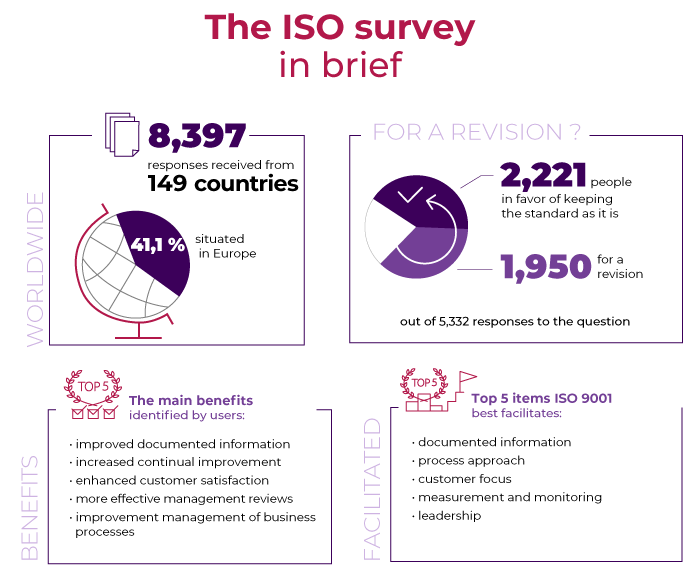ISO 9001: the 2015 version of the standard is confirmed

ISO 9001, probably the best-known voluntary standard in the world, has been confirmed in its 2015 version, and its revision postponed. Referenced NF EN ISO 9001 in France by AFNOR Editions, this global bible for quality management systems (QMS) does indeed seem to suit the majority of its users, as shown by the results of a public survey conducted by the International Organization for Standardization (ISO) between July and December 2020.
It has to be said that the previous overhaul, dating back to 2015, brought many changes, the fruit of a logical evolution since the late 1980s,” explains Elsa Lucas, project manager in charge of this theme at AFNOR Normalisation.. Following the adoption of the HLS (High Level Structure) for ISO 9001, which proposes a universal chaptering, all other management system standards (ISO 14001, 45001, 50001) must be grafted onto it, in line with a logic of continuous improvement. The aim is to offer an approach that is understandable and linear for everyone. “On average, the life cycle of a major management system standard is six to seven years. For example, the 2015 version of ISO 9001 was preceded by the 2008 version, just as the 2018 version of ISO 50001 (energy management) was preceded by the 2011 version.
The assessment of the 2015 version of ISO 9001 is largely positive, since as the survey shows, the overall difficulties appear to be minor, highlighting occasional needs for support and clarification on certain topics, such as organizational knowledge management or listening to relevant interested parties. ” There’s no sign of a desire to make profound changes. In fact, the vast majority of certified operators have taken on board the requirements. Today, the standard has been standardized and has become the basis for QMS certification. “analyses Elsa Lucas.
ISO 9001: building bridges
Another reason why ISO 9001 is not being revised any time soon is that the 2015 version has not yet been fully “digested” by many companies, particularly those that have initiated a QSE (quality, safety and environment) approach. “At present, only 21,000 people in France are certified, so there’s plenty of room for improvement,” stresses Aude Leroy, AFAQ ISO 9001 Product Manager at AFNOR Certification. In 2015, the foundation stone was laid for an integrated system, open to new sectoral needs and connecting routes. As the Quality Product Manager explains, “. articulation is the key word here. In fact, ISO 9001 is not only a support, but also a general basis for “.
Nevertheless, the users who responded to the ISO survey put forward numerous proposals, including those in favor of maintaining the standard, revealing several trends foreshadowing the future revision: integration of management standards, ethics and integrity (CSR), change management, quality culture, operational excellence, business continuity and innovation. “Whether it’s a question of professions or themes, we need to create the necessary gateways to other QMSs, such as ISO 22301 for business continuity planning, operational excellence (also known as lean management, based on FD X50-819), change management, and ISO 30401 for knowledge management,” adds Aude Leroy.
A preliminary project will be launched to examine whether a revision of the standard should take place before 2025, the next deadline for the systematic review process.
